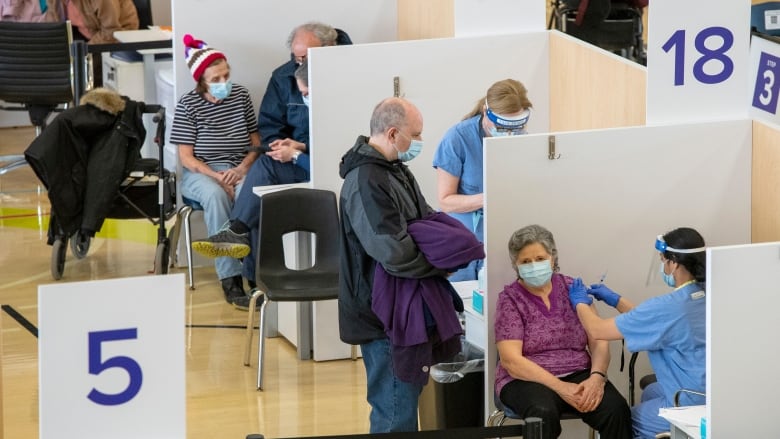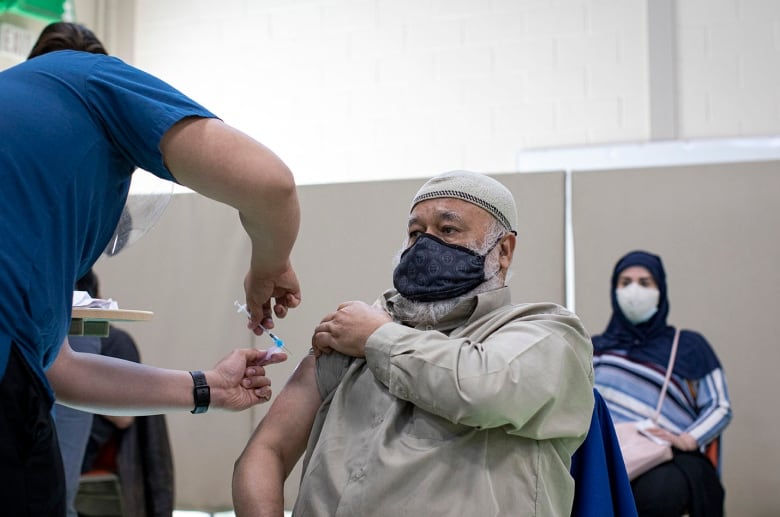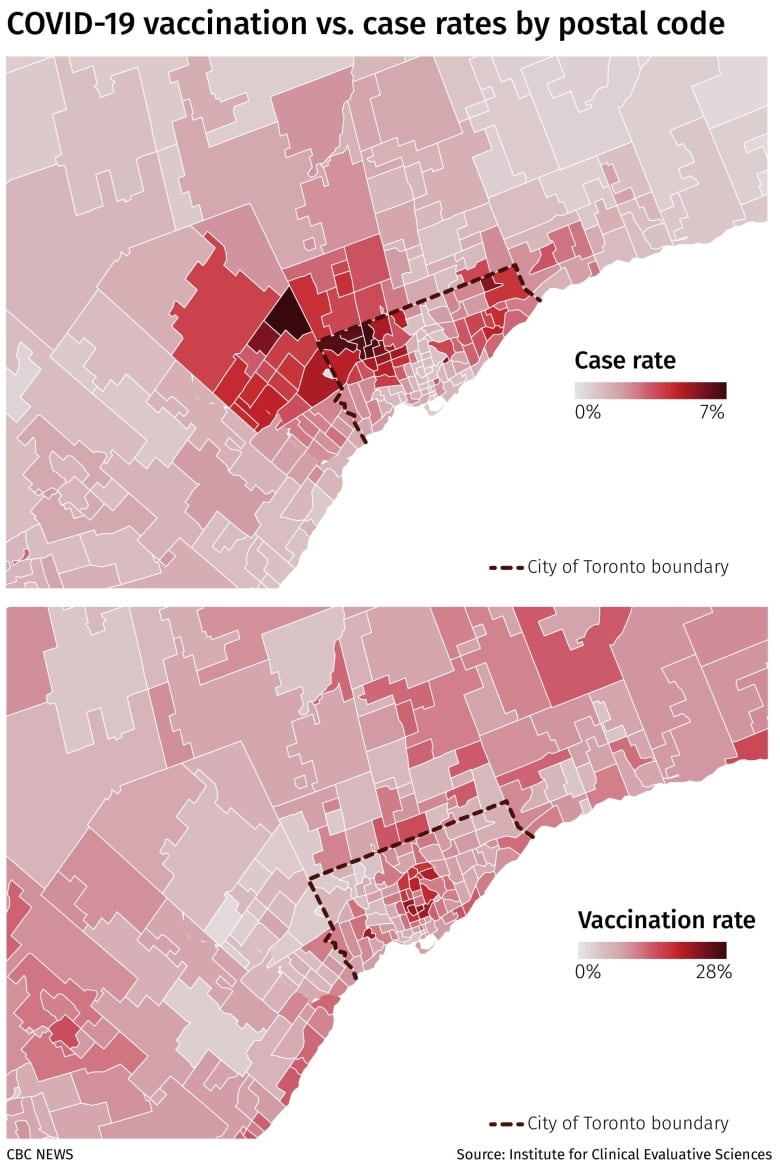Ontario imposes stay-at-home order as COVID-19 cases surge but stops short of instituting paid sick days
Order to take effect 12:01 a.m. Thursday in attempt to slow 3rd wave

Ontario has declareditsthird provincewide state of emergency as the number of COVID-19 cases surge, issuing a stay-at-home order effective 12:01 a.m. Thursday.
The province is also expanding vaccine eligibilityfor more people over the age of 18 in regions hardest hit by the virus, starting with Toronto and Peel Region.
Premier DougFord said mobile teams are being organized to offer vaccines to those 18 and over in high-risk congregate settings, residential buildings, faith-based locationsand locationsoccupied by large employers in hot-spot neighbourhoods. Education workers in high-risk neighbourhoods will be allowed to book vaccinations starting next week, he said.
"I continue to ask everyone to get a vaccine as soon as you're eligible to do so," Ford said.
Those who are eligible but haven't taken the vaccine are putting their life in jeopardy,he said.
If vaccination supplies stay consistent, Ford said, 40 per cent of Ontario adults should be vaccinated by the end of the four-week stay-at-home order.
'Playing politics'
Wednesday's new measures do not include paid sick daysdespite repeated calls by medical professionals, including the medical officers of health from Toronto, Peel and Ottawa.
"There's paid sick leave from the federal government," Ford said Wednesday. He accused those calling for hisgovernment to ensure paid sick days of "playing politics," before repeatedly urging people to use the federal program.
The federal government last fall introduced the Canada recovery sickness benefit, which provides $500 per week for up to two weeks to eligible workers. Critics say the program provides less money than a full-time, minimum-wage salary,involves processing delays of up to four weeks, and doesn't guarantee job security for workers who use it.
WATCH |Ford shares details ofstay-at-home order:
What does the order include?
The stay-at-home order requires allOntarians to remain at home except for essential purposes such as grocery shopping, accessing health-care services (including COVID-19 vaccinations), work that cannot be done remotely and exercise close to home with only those from one's household.
WATCH | Ontario's solicitor general defends timing of new restrictions:
Non-essential retailers will be limited to curbside pick-up and delivery. Access to malls will be limited to specific purposes such as curbside pick-up.Big-box store retail will also be limited to selling essential items such as groceries, household supplies, pharmacy items and personal care items.
Schools and child care will remain open in public health regions that permit them to be open.The province says new measures will be introduced following the spring break next week, including asymptomatic testing at assessment centres between April 12 and April 18, confirmation of self-screening for COVID-19 symptoms upon arrival to school andrefresher training on safety protocols for students and staff.
Residential evictions will also be halted.
Capacity will be limited to 25 and by appointment only at safety supply stores, optical stores, businesses selling motor vehicles, boat and other watercraft, vehicle repair and rental, telecommunications retailers. Garden centres and nurseries can continue to operate with 25 per cent capacity.
'Massive moves'
The move comes in the wake of criticism that restrictions announced last week what the government called "emergency brake"measures are insufficient to slow the spread of Ontario's third wave of COVID-19.
The Ministry of Health reported another 3,215 cases of the illness Wednesday morning, the most on a single day since Jan. 17, when the second wave was at its peak in the province. Health units also logged 17 more deaths of people with COVID-19, pushing the official toll to 7,475.

The seven-day average of daily cases has climbed to 2,988, its highest point since Jan.18.
The upward trend in new infections comes as the province logged a record-high day for vaccinations, with104,382 doses administered yesterday, according to the ministry.
Earlier Tuesday, Ford defended the measures he'd announced last week, yet hinted additional restrictions were coming.
"I think we made massive moves last week by basically shutting down the entire province," Ford said during a news conference Tuesday afternoon.
"That was huge, shutting down thousands and thousands of businesses, that I hate doing, but we're going to have further restrictions moving forward, very, very quickly."
Pressure growing
Even though the government's measures left malls open over the Easter weekend, Ford scolded Ontarians for going shopping.
"Alot of people were going into the malls and doing their little wander around and coming out with no bags,"Ford said. "I'm sorry, but going to the malls is not essential."

Pressure has grown in recent days on the Ford government to tighten public health measures and ensure better protections for the province's essential workers.
The medicalofficers of health from three of Ontario's biggest public health units Toronto, Peel Region and Ottawa urged the province on Monday to impose a stay-at-home order, travel restrictions between regions and an emergency mandate for paid sick days.
The top public health doctors in Toronto and Peel Regionalso ordered the closure of schools, sending nearly 600,000 students to online-only classes just days ahead of a rescheduled week-long spring break. Students in the Wellington-Dufferin-Guelph health unit are similarly shifting to online learning for the time being.
WATCH | Toronto's medical officer of health on closingschools:
Associationsrepresenting physiciansand nurses issued statements saying more needed to bedone to prevent further deathsand to ensure the health-care system is not overwhelmed.
Ontario has reported on average more than 2,800 new cases of COVID-19 daily over the past week. There are504people with COVID-19 being treated in ICUs. Admissions to intensive care previously peaked at 420 during the second wave of the pandemic earlier this year.
In Toronto, the health-care systemhasbecome so strained that the Hospital for Sick Children announced yesterday it would establish a temporary, eight-bed intensive care unit for COVID-19 patients aged 40 and under. The idea is that the new unit would help ease the burden on other hospitals in the city, which reported 1,095 more cases of COVID-19 in this morning's update.
Ford'sannouncement comes shortly after provincial health officials outlined Phase 2 of Ontario's immunization campaign.
Ontario's own COVID-19 science advisory table has repeatedly cautioned that the third wave driven largely by more transmissible and more deadly variants of concern is dangerously outpacingthe current rate of vaccinations, especially, in Toronto and Peel and York regions.
And a new analysis from ICES an Ontario research organization that tracks data on a broad range of health-care issues usedpostal codes to show people in Toronto's hardest-hit neighbourhoods aren't accessing COVID-19 vaccines at the same rate as those in higher-income areas that have seen far fewer infections.
For example, in the tony St. Clair and Rosedale areaabout 22.4 per cent of eligible adults have had at least one dose of aCOVID-19 vaccine, the most in any part of the city.
Compare that to the Jane and Finch area, whereonly 5.5 per cent of eligible adults have gotten their first shot, despite having a rate of hospitalizations and deaths from the illness more than eight times that of St. Clair and Rosedale.
With files from The Canadian Press
















_(720p).jpg)


 OFFICIAL HD MUSIC VIDEO.jpg)
.jpg)



























































































